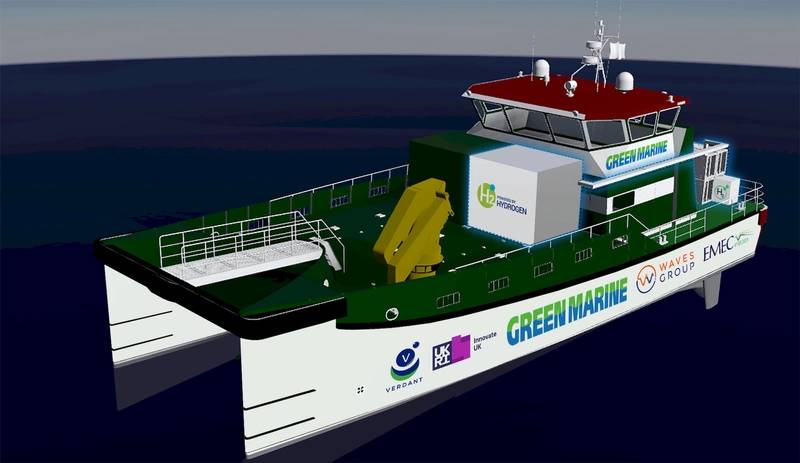RINA Greenlights Green Marine UK’s Hydrogen CTV Retrofit Initiative
Green Marine (UK)’s initiative looking to retrofit crew transfer vessels (CTV) with hydrogen, fuel cells and battery, with the aim to cut emissions while servicing offshore wind farms, has been granted Approval in Principle (AiP) by global classification society RINA.
The first phase of Project Verdant, involving a preliminary design and feasibility study, has now been completed and deemed viable, opening the door to subsequent project phases seeking to execute design, engineering and sea trials.

Led by Green Marine (UK), the Innovate UK funded project includes maritime consultancy Waves Group and the European Marine Energy Centre (EMEC).
Project Verdant’s conceptual design incorporates hydrogen fuel cells connected to electric motors, working in conjunction with existing diesel-fueled engines, which can be shut down to enable zero emission operation at slow speed while servicing offshore wind farms.
Hydrogen systems and marine fuel cell generator firm Energys helped design and provide engineering and modelling. Meanwhile, Engineered Marine Systems (EMS) supplied a design for the battery room, drawn from its extensive experience involving multiple hybrid CTVs.
Findings show the hybrid system could reduce the vessel’s CO2 emissions by up to 30% and NOx emissions by up to 40% - with CTVs commonly operating in loiter mode for long periods at a time.
The ultimate mission is to capture sufficient learning from the operation of a retro-fitted vessel to enable Green Marine UK to expand its fleet with new-build zero emissions CTVs and service operation vessels (SOVs).
“Following the review of a comprehensive package of design documentation and drawings, Project Verdant’s technical solution has been officially approved in principle by RINA.
“With technical feedback supplied by RINA we now have all the necessary input to progress to the detailed design and implementation phase.
“Retrofitting CTVs in the manner prescribed by Project Verdant provides a means of significantly de-risking the implementation and testing of hydrogen fuel-cell vessels in the coastal environment.
“Once the concept has been proven up, there is potential to rapidly replicate. This would enable economies of scale to be leveraged and remove barriers to adoption,” said Jason Schofield, Green Marine (UK)’s Managing Director.
“The system is designed to enhance vessel redundancy and flexibility by utilizing locations where hydrogen is, or will be, readily available. This approach creates a test bed to advance maritime decarbonization in a challenging sector without significantly impacting the vessel’s operational profile.
“This initiative demonstrates that a new standard for environmental responsibility in offshore services is achievable from both a technical and commercial perspective,” said Jeremy Panes, Waves Group Engineering Director.
